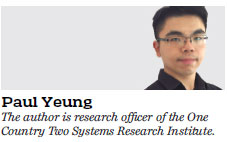President Xi takes lead in sci-tech collaboration drive
Updated: 2018-05-17 06:02
(HK Edition)
|
|||||||
The world of science and technology is developing rapidly. Hong Kong-mainland collaboration in this area has also scored a significant breakthrough after President Xi Jinping instructed different central government authorities to help promote cross-boundary cooperation on the technology front. The central government's moves to facilitate closer cooperation between the two sides highlight Hong Kong's unique role in the development of science, technology and innovation. This is indeed a full recognition of Hong Kong's strong foundation in technology.
Xi's instructions provided a key to open the door of science and technology collaboration between the "two systems" of the "one country". Following the instructions, the Ministry of Science and Technology and the Ministry of Finance have promulgated rules and provisions on opening up science and technology funding from the national coffers for application by higher education and research institutions in Hong Kong. Hong Kong scientists have been complaining about restrictions on cross-boundary usage of national scientific research funds in the city, as well as the tariffs imposed on scientific research equipment brought into the mainland. Due to restrictive foreign-exchange policies, Hong Kong scientists can only use the national funding if they have a laboratory on the mainland. What is more, it was costly for them to move machines and equipment across the border for research work on the mainland. Under the new policies, national funding can be transferred to Hong Kong; the tariffs will be greatly reduced on equipment brought by Hong Kong researchers to the mainland. This will encourage more Hong Kong scientists to conduct research on the mainland and therefore facilitate their research work.

The new campaign on cross-boundary cooperation actually goes beyond this. Just one week before, the special administrative region government launched a Technology Talent Admission Scheme to provide a fast-track arrangement for admission of overseas and mainland research and development talent. Some critics have assailed the policy, saying it favors talent from the mainland and hurts local talent. Xi's instructions to promote cross-boundary cooperation by facilitating Hong Kong-based scientists' research work provided the best rebuttal of such narrow and biased views, which obviously overlook the significance of collaboration and the mutual benefits to be created. In fact, the new national policies on technology cooperation were taken in response to an appeal by 24 Hong Kong-based scientists and university professors, who wrote to Xi last June to express their aspirations to contribute to the nation's technology development.
Indeed, Hong Kong's interest is well-considered by the central government. According to Xinhua reports, the ministries concerned, together with the Liaison Office of the Central People's Government in the Hong Kong Special Administrative Region, would collect all views and recommendations from the SAR government and the local technology sector, and would implement those that are practicable quickly through pilot schemes and with preferential treatment.
Mainland subsidiaries set up by Hong Kong-based scientific research institutions would benefit from the mainland's import tax incentives aimed at encouraging technological innovation. These newly announced benefits and incentives echoed the speech released by Zhang Xiaoming, director of the State Council's Hong Kong and Macao Affairs Office, last week. Zhang said: "We need to have mutual respect, and put ourselves in each other's shoes. In particular, we need to give enough respect to the views of the Hong Kong and Macao governments." Moreover, Zhang suggested that in managing Hong Kong and Macao affairs, there would be different acceptable approaches. The central government should try to use the methods put forth by the two SAR governments.
Development of science and technology concerns national policy and strategy, rather than being merely a local issue. From the view of the central government, Hong Kong is a key actor in national development. Just as Xi said at the 19th National Congress of the Communist Party of China last October, the central government "will continue to support Hong Kong and Macao in integrating their own development into the overall development of the country". With this in mind, our compatriots in Hong Kong and Macao will share both the historic responsibility of national rejuvenation and the pride of a strong and prosperous China. The practice of this guiding principle on the development of the two SARs has resulted in making "collaboration" a national mission. The president's instructions on technology cooperation are part of this national mission.
The president's move also underscores Hong Kong's potential as an innovation hub. John F. Kennedy's famous quote reminded us: "Ask not what your country can do for you; ask what you can do for your country." Collaboration is two-way interaction. Beijing has showed its support for Hong Kong, giving credit to us and listening to our views; Hong Kong should be more active in playing its role in national development.
(HK Edition 05/17/2018 page8)